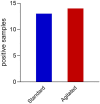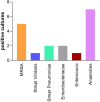Pleural fluid agitation for improving the microbiologic diagnostic yield in pleural infection: a feasibility study
- PMID: 40251602
- PMCID: PMC12008872
- DOI: 10.1186/s12931-025-03208-7
Pleural fluid agitation for improving the microbiologic diagnostic yield in pleural infection: a feasibility study
Abstract
Background: Pleural infection is a commonly encountered respiratory disease but in > 40% the underlying microbiologic etiology is unknown. This feasibility study aims to investigate whether pleural fluid agitation prior to sample aspiration is safe and can improve the diagnostic yield of microbiologic analysis.
Methods: Thirty adult patients with pleural infection, based on clinical, imaging and biochemical evidence, were included in this feasibility study. Ultrasound guided thoracentesis was performed with an initial standard aspiration sampling technique, followed by pleural fluid agitation into the pleural cavity for 3-5 cycles before collecting the agitated fluid. Coded samples were sent for biochemical and microbiologic analysis with culture in aerobic and anaerobic media.
Results: No complications were encountered with the pleural fluid agitation technique. Overall, 14 (46.6%) of patients had a positive pleural fluid culture. No yield discordance was noted between the standard and the agitated pleural fluid sampling techniques except for 1 extra agitated sample growing klebsiella pneumoniae and another agitated sample with mixed infection showing an additional anaerobic bacterial growth. Four (30.8%) of the 13 concordantly positive samples showed heavier bacterial growth in the agitated samples using semi-quantitative culture scoring.
Conclusion: Pleural fluid agitation was safe but didn't significantly add to the microbiologic yield in pleural infection. However, higher bacterial growth in almost one third of positive samples suggests a potential effect for further investigation in a larger study. Despite being safe, pleural fluid agitation resulted in no significant improvement in the microbiologic yield among pleural infection. However, agitated samples grew more bacteria in almost a third of the positive samples suggesting a signal for further investigation in a larger study.
Study registration: Clinicaltrials.gov - NCT05702580, 23/12/2022.
Keywords: Fluid agitation; Microbiologic yield; Pleura; Pleural infection; Thoracentesis; Thoracic ultrasound.
© 2025. The Author(s).
Conflict of interest statement
Declarations. Ethical approval: The study protocol was approved by the Ethics Committee at Alexandria University Faculty of Medicine (0107486) and registered at Clinicaltrials.gov: NCT05702580, 23/12/2022. Consent for publication: Not Applicable. Consent to participate: All participants signed a written informed consent form. Competing interests: The authors declare no competing interests.
Figures
Similar articles
-
Low yield of microbiologic studies on pleural fluid specimens.Chest. 2005 Mar;127(3):916-21. doi: 10.1378/chest.127.3.916. Chest. 2005. PMID: 15764776
-
Routine Microbiologic Studies of Pleural Fluid Specimens in Cancer Patients.Am J Med. 2020 Feb;133(2):240-244. doi: 10.1016/j.amjmed.2019.07.022. Epub 2019 Aug 8. Am J Med. 2020. PMID: 31401163 Free PMC article.
-
Etiology of parapneumonic effusion and pleural empyema in children. The role of conventional and molecular microbiological tests.Respir Med. 2016 Jul;116:28-33. doi: 10.1016/j.rmed.2016.05.009. Epub 2016 May 10. Respir Med. 2016. PMID: 27296817 Free PMC article.
-
[Thoracentesis in Primary Care].Semergen. 2019 Oct;45(7):474-478. doi: 10.1016/j.semerg.2019.02.005. Epub 2019 Apr 11. Semergen. 2019. PMID: 30982668 Review. Spanish.
-
Advances in pleural effusion diagnostics.Expert Rev Respir Med. 2020 Jan;14(1):51-66. doi: 10.1080/17476348.2020.1684266. Epub 2019 Nov 5. Expert Rev Respir Med. 2020. PMID: 31640432 Review.
References
-
- Bedawi EO, Hassan M, Rahman NM. Recent developments in the management of pleural infection: A comprehensive review. Clin Respir J. 2018;12(8):2309–20. - PubMed
-
- Davies CW, Kearney SE, Gleeson FV, Davies RJ. Predictors of outcome and long-term survival in patients with pleural infection. Am J Respir Crit Care Med. 1999;160(5 Pt 1):1682–7. - PubMed
-
- Lehtomäki AI, Nevalainen RM, Toikkanen VJ, Pohja ES, Nieminen JJ, Laurikka JO, Khan JA. Pleural infection-an indicator of morbidity and increased burden on health care. Interact Cardiovasc Thorac Surg. 2020;31(4):513–8. - PubMed
-
- Lehtomaki A, Nevalainen R, Ukkonen M, Nieminen J, Laurikka J, Khan J. Trends in the incidence, etiology, treatment, and outcomes of pleural infections in adults over a decade in a Finnish university hospital. Scand J Surg. 2020;109(2):127–32. - PubMed
-
- Wu J, Liu C, Lee S, Kuo Y, Hsieh T. Assessment of the Charlson comorbidity index score, CHADS2 and CHA2DS2-VASc scores in predicting death in patients with thoracic empyema. Heart Lung. 2018;47(2):157–61. - PubMed
Publication types
MeSH terms
Associated data
LinkOut - more resources
Full Text Sources
Medical



